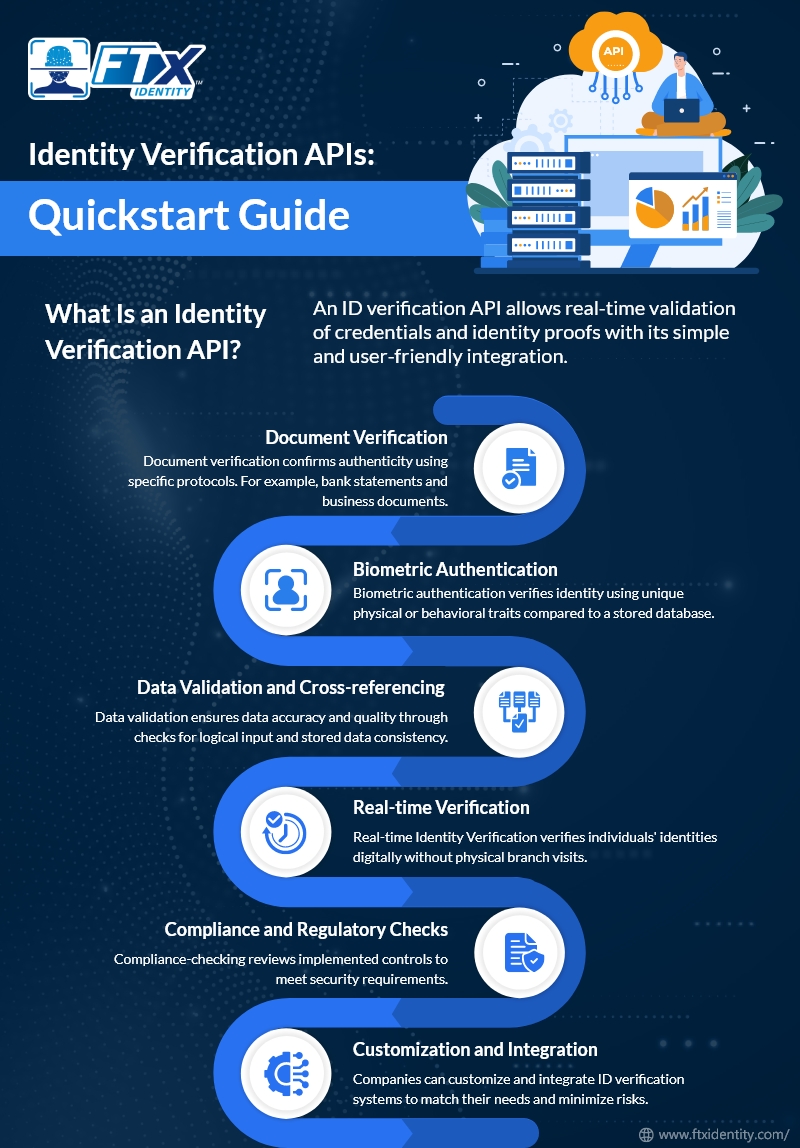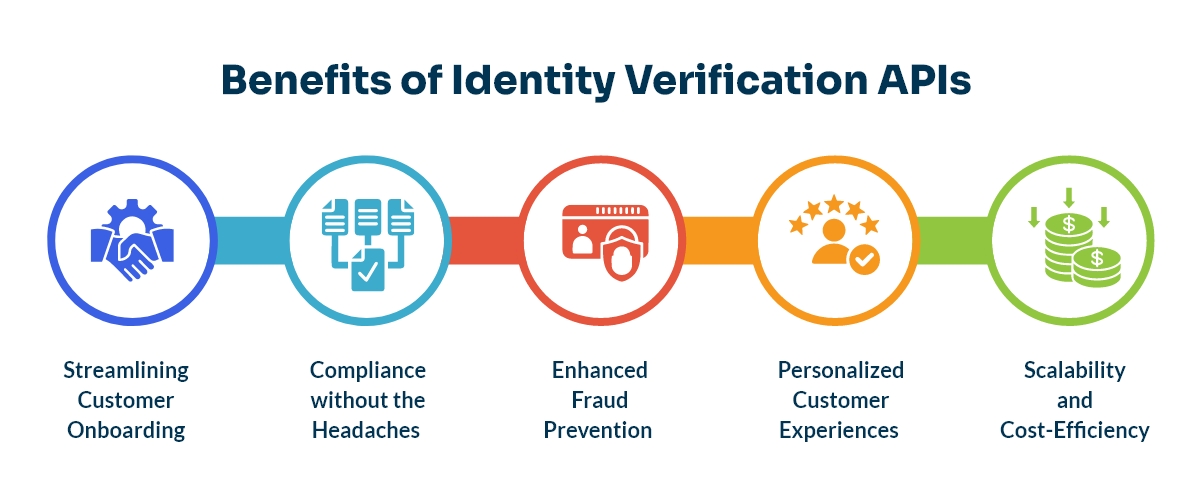Strong identity verification is essential in today’s digital age, where adding new customers can be as easy as opening a new browser. Making sure that each new user is who they say they are isn’t just a rule that many industries must follow; it’s also key to building trust in any modern business.
This guide simplifies the important role of identity verification APIs in building trust, meeting regulatory standards, and protecting your business from fraud.
What Is an Identity Verification API?

Integrating with Your System
One of the key selling points of an identity verification API is its ease of integration. It seamlessly integrates with your existing software, such as mobile apps or online platforms, allowing you to leverage its capabilities without overhauling your entire system.
Handling Various Document Types
An effective identity check API can work with many types of identity documents, including passports, IDs, driver’s licenses, and utility bills. This makes it flexible and useful for meeting various identity verification needs around the world.
How Does Identity Verification API Work?
Identity verification APIs utilize a combination of advanced technologies to streamline the verification process.
Here’s a deeper dive into the key steps:
Image Capture
- High-Resolution Capture: The user submits a clear and high-resolution image of their government-issued ID. This can be achieved through various methods, such as uploading a photo from their device or using a device’s camera to capture the image in real-time.
- Ensuring Image Quality: The system may include features to ensure image quality, such as guidance on proper lighting and device positioning, to optimize the accuracy of subsequent processing steps.

Data Extraction
- Handling Variations: The OCR engine must be robust enough to handle variations in document types, font styles, image quality, and lighting conditions.

Data Verification
- Cross-Referencing with Databases: The extracted data is meticulously cross-referenced with a variety of databases, including government records, credit bureaus, and other relevant sources.
- Liveness Detection: To prevent fraud, many APIs incorporate liveness detection features. This may involve analyzing facial features, eye movement, or other biometric indicators to ensure that the person presenting the ID is a living individual.
- Fraud Detection: Advanced algorithms are employed to detect potential anomalies, inconsistencies, or signs of tampering in the presented ID or the verification process.
Key Features of Identity Verification APIs

These APIs do more than just scan documents. They have advanced features that make sure the verification process is thorough and reliable.
Document Verification
Document verification is the foundation of any identity check. By assessing the authenticity of the document, the government ID verification API looks for signs of tampering or forgery. This includes things such as watermark presence, paper quality, or the alignment of text and images.
Biometric Authentication
Modern identity verification APIs incorporate biometric data, such as facial recognition or fingerprint scans, to provide an additional layer of verification, making it much harder for fraudulent actors to bypass security.
Data Validation and Cross-Referencing
APIs compare the details provided with those on the document and cross-reference them with global databases to detect any inconsistencies or inaccuracies, ensuring that the data is not only accurate but also accountable.

Real-Time Verification
In the digital world, speed is crucial. Real-time verification makes processes faster and avoids delays, meeting customer needs or transaction deadlines.
Compliance and Regulatory Checks
Identity verification APIs are designed to meet a wide range of regulations, including KYC (Know Your Customer), AML (Anti-Money Laundering), GDPR (General Data Protection Regulation), and HIPAA (Health Insurance Portability and Accountability Act). These APIs perform necessary checks during the identity verification step to catch any potential issues early on.
Customization and Integration
Each business’s verification needs are unique. These APIs are highly customizable, allowing you to tailor the verification process to suit your specific requirements. Their seamless integration means that you can upgrade and adjust the verification process as your business grows and as regulations change.
Benefits of Identity Verification APIs

Employing an ID check API can have profound benefits for your business, both in terms of security and customer experience. Here’s what you can expect from integrating this technology:
Streamlining Customer Onboarding
By automating the initial identity verification steps, you can transform a potentially lengthy and tedious process into a quick and user-friendly experience. This streamlined onboarding process is invaluable for retaining customers in a competitive market.
Compliance without the Headaches
Staying on top of regulatory changes and ensuring your verification processes are compliant can be a logistical nightmare. APIs take the strain, automatically updating to meet the latest requirements, and alerting your team to any necessary changes.

Enhanced Fraud Prevention
Using document checks, biometric verification, and checks against external databases creates a strong barrier against fraud. API-driven checks greatly lower the chance of identity theft and related crimes.
Personalized Customer Experiences
With an identity verification API, you can leverage the verified information to create personalized customer experiences. Tailored services and promotions based on verified customer profiles can result in higher customer satisfaction and loyalty.
Scalability and Cost-Efficiency
APIs easily scale with your business growth. There’s no need to create new verification processes when entering new markets or launching products. Identity verification APIs make scaling smooth and cost-effective.
Choosing the Right Identity Verification API for Your Business

Choosing the right identity verification API is crucial for your business to benefit fully. There are many options out there, but here’s what you need to keep in mind:
Features and Functionalities
Understand the features and functionalities offered by different APIs and ensure they align with your business goals. The API should be capable of verifying a range of identity documents, offering biometric confirmation, and providing real-time validation.
Global Reach and Document Support
Consider the geographic nature of your customer base and select an API that supports the recognition of documents from those regions. Ensure the API has a wide reach, as you may deal with customers operating across international borders.
Pricing and Scalability
APIs come with a variety of pricing models. Consider your current and potential usage and find a model that fits your financial plan. Also, verify the scalability of the API to ensure it can grow with your business.

Security and Compliance Standards
An API should meet, or exceed, industry security standards and be compliant with relevant data protection regulations. Check for certifications and evaluate how the API handles sensitive customer data.
Ease of Integration
The API should be relatively easy to integrate into your system, with a comprehensive set of documentation and robust developer support. Always consider the resources and time necessary to implement the new verification processes.
How FTx Identity Can Help
In the ever-evolving landscape of digital identity, FTx Identity stands apart. We’re not just about checking boxes; we’re about empowering businesses with a truly intelligent and human-centric approach to age verification.
- Beyond Compliance: We understand that compliance is crucial. But FTx Identity goes beyond simply meeting regulations. We help you build a stronger foundation for your business by fostering trust with your customers through secure and accurate identity verification.
- Driving Growth: By incorporating a sublime age verification process, FTx Identity frees you to focus on what truly matters: expanding your customer base, increasing sales, and enhancing overall business growth.
- A Seamless Customer Experience: We believe that age verification shouldn’t be a barrier to a positive customer experience. FTx Identity is designed to be seamless and intuitive, ensuring a smooth and frictionless journey for your customers.
- Leveraging Innovation: We leverage cutting-edge technology, including AI and machine learning, to deliver a sophisticated and reliable verification solution that adapts to the ever-changing digital landscape.
Conclusion
Identity verification APIs play a key role in establishing trust online. They speed up and improve the reliability of the verification process, which helps businesses keep their operations and their customers safe. This results in safer, more personalized experiences. Smart selection and integration of the right identity verification API can greatly help businesses succeed in a world where trust is crucial.
If you’re ready to learn more about FTx Identity, reach out to us today to schedule a consultation and experience a demo!
Build Trust With Identity Verification APIs
Stay ahead of evolving regulations and minimize risk with robust customer
reverification practices powered by FTx Identity.
